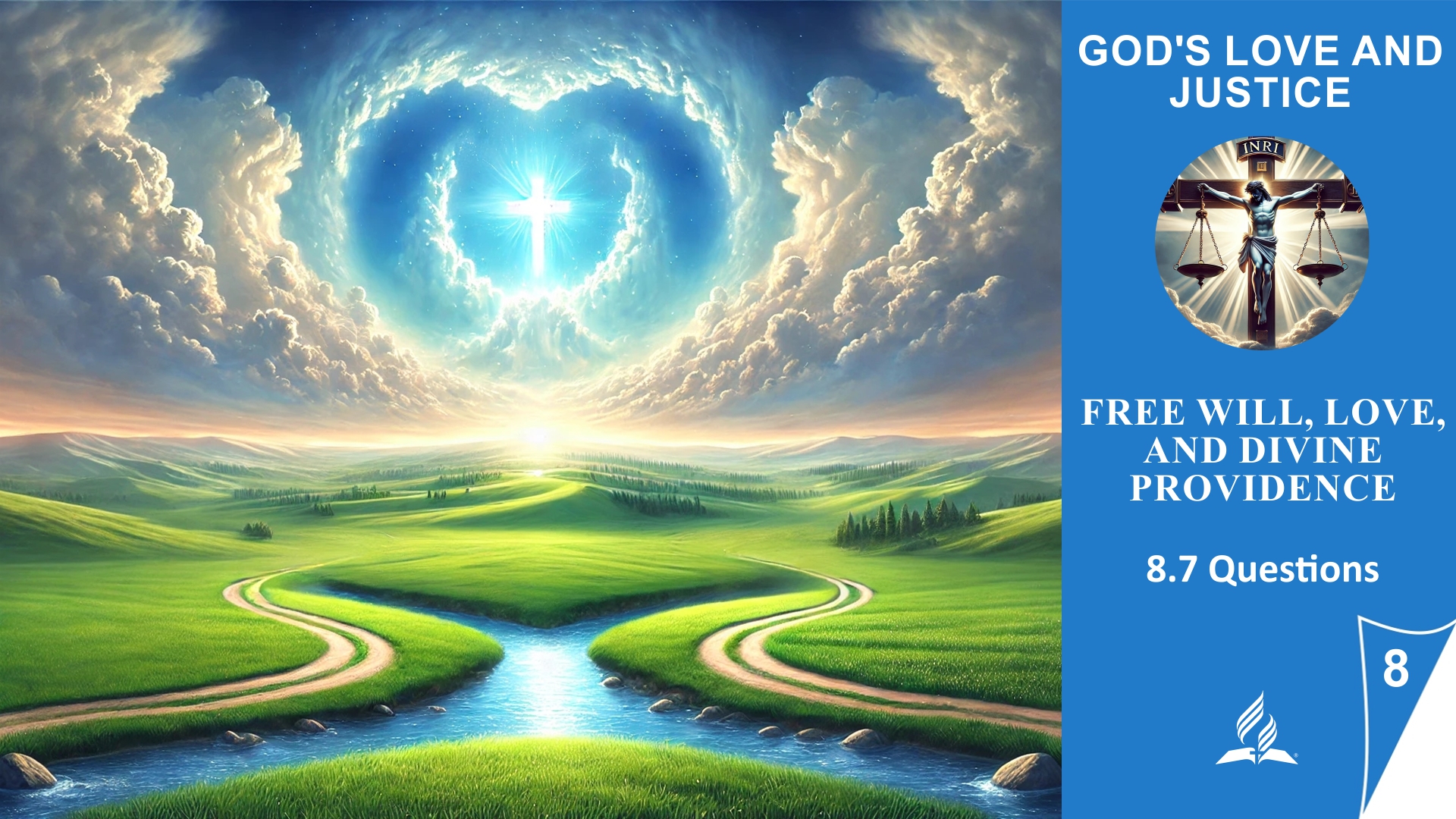



1.How does the fact that God does not always get what He wants affect the way you think about what happens in this world? What practical implications does the realization that God has unfulfilled desires have?
The realization that God does not always get what He wants – primarily because He respects human free will – deeply transforms our view of what happens in this world. Instead of seeing every event as a direct consequence of God’s will, we understand that many situations result from human decisions and the fallen nature of this world.
This fact helps us to refrain from blaming God for every misfortune, and instead, to take responsibility for our own actions. It explains why suffering, injustice, and evil exist, even though God is good and desires love. God wishes that all people be saved, yet many choose otherwise – not because God lacks power, but because He places love and freedom above coercion.
Practical implications:
-
Mercy towards others: We judge people less harshly because we recognize that God himself is patient and does not force anyone to do good.
-
Responsibility for one’s own decisions: We take our actions more seriously, understanding that our choices have consequences—for ourselves and others.
-
Hope despite chaos: Even when much goes wrong, we can know that God continues to work to reach people and turn situations for the better.
-
Motivation for prayer: When God’s desires are not always fulfilled, it shows how important our participation is. We are invited to work together with God through prayer and deeds.
-
Compassion for God’s pain: It makes us more sensitive to God’s heart, which suffers when people reject Him or choose evil. This deepens our relationship with Him.
➡️ Key idea: God does not force – He invites. This realization encourages us to actively stand for what is good, take responsibility, and reflect God’s love in a world that is often resistant.
2.When we return to the example with the cake from Thursday, we can understand why God and Christ created us, even though they knew of Satan’s fall. Love had to be part of the equation, and love meant freedom. Rather than creating us as beings incapable of love, God created us so that we can love, but He did so knowing that this would ultimately lead Jesus to the cross. What does this tell us about how holy and fundamental love is to God’s rule that Christ would rather suffer on the cross than deny us the freedom inherent in love?
This question reveals one of the deepest truths about God’s character and His dealings with creation: Love is the foundation of God’s rule. It is so holy, precious, and indispensable that God was willing to allow the possibility of rebellion, evil, and suffering—only so that genuine love could exist.
True love is always voluntary. It cannot be forced or extorted. God could have created beings that automatically “loved” Him, but that would not have been genuine love. Instead, He created humans with free will—fully aware that they could reject Him and that such rejection would cause immeasurable suffering. And yet, He chose this path because love is worth it.
That Christ preferred to suffer on the cross rather than take away our freedom shows:
-
God’s love is selfless and sacrificial: He places our freedom above His own pain.
-
Love is the highest principle in the universe: It is non-negotiable. God would rather die than forgo the possibility of a true relationship.
-
God risks the worst to enable the best: He was aware of the cross, yet the joy of love and fellowship with us prevailed.
-
Freedom is not a cheap gift: It was paid for at the highest price—the life of Jesus.
Practical significance for us:
-
We are deeply loved: If God paid this price for our freedom, our value in His eyes is immeasurable.
-
Love also demands sacrifice: If we wish to love, we must learn to forgive, to be patient, and to think beyond ourselves.
-
We must not abuse freedom: Freedom is a gift that comes with responsibility.
-
God’s love endures even when we fail: He did not suffer for perfect people, but for everyone—precisely because we show our weaknesses.
➡️ Key idea: Love is the heart of God’s rule. It is so sacred that Christ paid the highest price to grant us the freedom to love. May we reciprocate this love and reflect it in our lives.
3.We often lament the evil and suffering in this world, but how often do you take the time to consider that God himself laments and grieves over the suffering and evil? What difference does it make for your understanding of evil and suffering when you realize that God also suffers under evil?
When we think about suffering, we often focus on our own pain or the suffering of others. Yet, we rarely pause to recognize that God Himself suffers amidst the evil and pain in this world. He is not a distant observer, but a compassionate Father whose heart is deeply affected by the consequences of sin.
The Bible already reveals this pain:
-
In Genesis 6:6 we read, “The Lord regretted that he had made human beings on the earth, and his heart was deeply troubled.” – God’s heart grieves over the wickedness of humanity.
-
Isaiah 63:9 says, “In all their distress he too was distressed.” – God suffers with His people.
-
Most clearly, God’s suffering is shown on the cross: Jesus bore the full weight of sin and evil. His cry, “My God, my God, why have you forsaken me?” (Matthew 27:46) reveals how deeply God is involved in the suffering of the world.
Why does this realization change our understanding of evil and suffering?
-
God is not indifferent: He does not sit on a cold throne and merely watch the chaos. He is moved, affected, and deeply touched by the pain of the world.
-
We are not alone in our suffering: When we suffer, God is not only with us – He suffers with us. This brings comfort and security.
-
God’s patience is an act of love: He sees the wickedness, feels the pain, and yet sustains the world because He still wishes to save many (2 Peter 3:9).
-
Evil breaks even God’s heart: When we are outraged by injustice, we may know that God’s pain over it is even greater. His justice will one day prevail.
-
The cross becomes even more meaningful: God not only recognized evil but confronted it. He bears the burden of our guilt.
➡️ What does this mean for us?
-
We may lament but not despair: Our suffering is also God’s suffering – and that gives hope.
-
God understands us completely: There is no pain He has not experienced Himself.
-
We can learn compassion: If God suffers so deeply, we too should be sensitive to the pain of others.
-
His sharing in our suffering is a sign of His love: We are never forgotten – not even in the darkest moments.
👉 Key idea: When we realize that God suffers under evil, we understand that we are not alone in our pain. His compassionate heart beats for us—and His suffering over evil shows just how much He longs for a world without pain and tears.
4.How does this truth – that many things happening in this world are not according to God’s will – help you deal with your own suffering, especially when it seems senseless and appears to lead to nothing good?
The realization that not everything that happens in this world is according to God’s will can be initially unsettling. After all, the question often arises: “If God is all-powerful and good, why does He allow suffering?” Yet understanding that God does not desire suffering and evil, but that they are often the result of human decisions or the fallen state of the world, changes our perspective on pain and injustice.
💡 How does this truth help us in personal suffering?
-
Suffering is not God’s punishment:
-
When we suffer, it does not mean that God rejects or punishes us.
-
This understanding relieves guilt and the tormenting question: “Why is this happening to me?”
-
-
God weeps with us:
-
God is not the cause of our pain but the comforter within it.
-
He suffers with us and fully understands our pains (Hebrews 4:15).
-
-
Suffering is often a consequence of a fallen world – not a cruel plan:
-
Disease, death, and injustice often stem from a system tainted by sin.
-
Knowing that God never intended it this way offers hope for a better future.
-
-
God can create blessings even from senselessness:
-
Even if the suffering seems to have no apparent purpose, God can use it to strengthen us inwardly (Romans 8:28).
-
Sometimes, we recognize its purpose only in retrospect – or in eternity.
-
-
There may be questions – but also trust:
-
We do not have to understand everything. Faith often means trusting despite the lack of understanding.
-
Job did not understand his suffering, yet in the end, he recognized God’s nearness and justice.
-
-
Hope for a future free of suffering:
-
Revelation 21:4 promises: “He will wipe away every tear… and there will be no more death.”
-
Suffering is not the final word – God’s plan for healing is greater.
-
➡️ Practical application:
-
In dark moments, we can say: “I do not understand it, but I trust You, God.”
-
We may bring our questions, anger, and sorrow to God – for He is able to bear them.
-
Suffering can make us more sensitive to others who are also struggling.
-
Hope means that even if the meaning remains hidden, God is with us and holds us close.
👉 Key idea: Not all suffering is willed by God – and that is comforting. It shows that He is not our enemy, but our helper in pain. Even if the “why?” remains unanswered, one thing is certain: God loves us, suffers with us, and leads us through—even when we cannot see the way.
(Visited 20 times, 1 visits today)




















